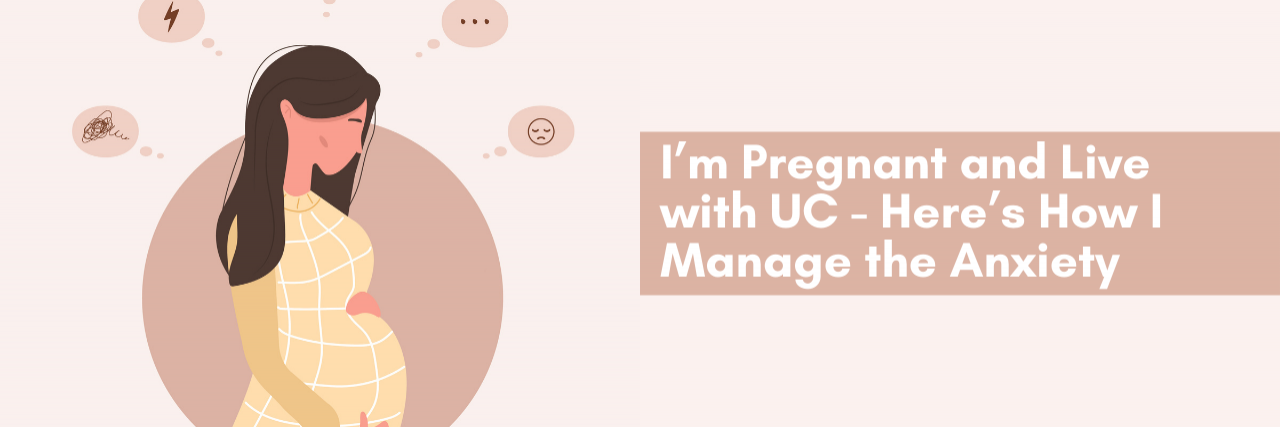I remember the exact moment I saw that plus sign. At first, it was one line, so I shrugged it off and flushed the toilet. Glancing back, my heart stopped as a faint plus sign started to form. I picked up the stick and stared at it, shaking from excitement, shock, and nerves. I walked out of the bathroom at the exact moment my husband walked in the door from work. I was holding the pregnancy test in one hand and covering my mouth with the other. Needless to say, he asked, “Are you pregnant?!”
I was indeed pregnant … 20 years after being diagnosed with ulcerative colitis.
Among my close friends, I’ve been pretty vocal about my uncertainty of wanting to have kids. My husband and I talked about it many, many, many times before we got married. I grappled with my anxieties in therapy, on my own, with friends, in journals, and through self-reflection. It wasn’t that I didn’t think I could “do it,” or that I would be a “bad mom.” (I’m going to be an amazing mom.) My biggest pause came from living with UC. Quite simply, I didn’t want my child to have to go through what I went through.
Now before anyone goes, “Well, there isn’t any conclusive evidence that it’s genetic,” or “I have it and my child is fine,” or “You can’t hold back your dreams because of UC,” I know all of this. I live and breathe these types of sentiments every single day of my life. However, when it comes to imagining a small child, adolescent, teen, or even grown adult having to wade through the waters of inflammatory bowel disease the way I have to, and for me to be one of their main caretakers, I simply couldn’t stuff away the fear. While yes, I’d know what they’d need, that’s also the downfall; I’d know what exactly they’re going through. Suffering. Hurting. Questioning. Scared. All the things I’ve felt over the last two decades. Toss on top the worry of that stress causing my own flare, and it can roll into one big ball of anxiety.
So there I was, pregnant and thinking, Well, I guess this is happening. I’m not in the business of borrowing problems that don’t exist, so over the last 26 weeks or so, I’ve been working on taking things as they come and shifting my perspective on what life can, and will be, like while raising a kid who may or may not live with IBD. Both are possibilities, so I don’t want to waste any more energy giving one scenario more power than another.
If you find yourself wanting to be a parent but are hesitant about “passing” IBD down to them, here are some of the ways I’m navigating that big question mark.
- Don’t try to predict things. Take it as it comes, and cross bridges when they’re in sight, not when they might be way down the road.
- Trust you know what to do. At least one thing is true: we are the experts of IBD, so we do and will know what to do if needed.
- Connect with other parents living with IBD. Even if their children don’t live with it, it’s a good support system for you as the parent.
- Honor your fears and hesitations, because they’re valid. Don’t let anyone blind you with optimism or downplay your concerns. I hear your fears and concerns and understand them.
- Find your support system. If you’re getting pregnant with a partner, lean on them for support. Reach out to friends and family members.
- Talk about it in therapy. Trained professionals are really good at digging up the meat of the concerns and shining a safe light on them.
- Do some research. Unlike when I was diagnosed in 2001, there is so much more out there about navigating IBD, including IBD in young children.
- Take deep breaths. Seriously, sometimes just breathing is a good solution.
- Know it’s OK if you choose not to have kids. Society tells us a story that people, especially people in relationships, need to have kids. You don’t. You need to do what’s best for you.
- Let yourself feel everything. If you need today to be a really bad day, cry it out. If you have a great day, let today be amazing. If you’re somewhere in the middle, sit with it for a bit and reflect on what you need the most.
Remember: Just because you’re wanting to be a parent to another person, it doesn’t mean you need to put yourself on the back burner. One of the best things we can all do as IBD patients is take care of ourselves first and make sure our own oxygen mask is in before assisting with someone else’s. This isn’t selfish; it’s self-care.

